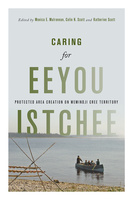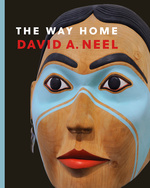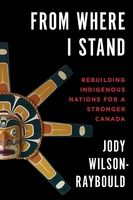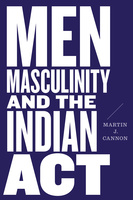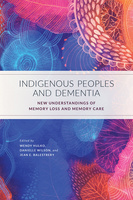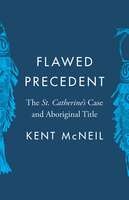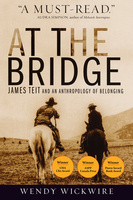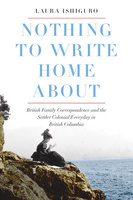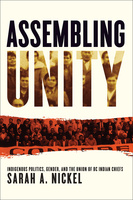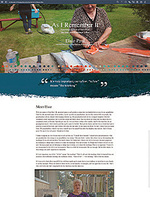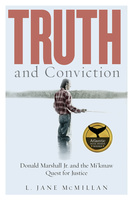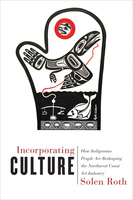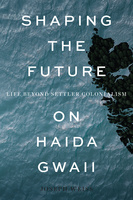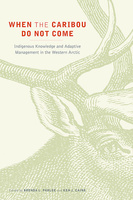Caring for Eeyou Istchee
Protected Area Creation on Wemindji Cree Territory
In Caring for Eeyou Istchee, Indigenous and non-Indigenous partners reveal how protected area creation presents a powerful vehicle for Indigenous stewardship, biological conservation, and cultural heritage protection.
The Way Home
Crafted from memories, legends, and art, this powerful memoir tells the uplifting story of an Indigenous man’s struggle to reconnect with his culture and walk in the footsteps of his father and the generations of Kwakwa̱ka̱’wakw artists that came before him.
From Where I Stand
Rebuilding Indigenous Nations for a Stronger Canada
Jody Wilson-Raybould outlines in impassioned, inspiring prose the actions that must be taken by governments, Indigenous Nations, and all Canadians to achieve true reconciliation in this country.
Men, Masculinity, and the Indian Act
Men, Masculinity, and the Indian Act reverses conventional thinking to argue that the sexism directed at women within the act in fact undermines the well-being of all Indigenous people, proposing that Indigenous nationhood cannot be realized or reinvigorated until this broader injustice is understood.
Indigenous Peoples and Dementia
New Understandings of Memory Loss and Memory Care
Indigenous People and Dementia brings together research and Indigenous knowledge on memory loss and memory care in later life to assist students, practitioners, and educators to decolonize their work with Indigenous peoples.
Flawed Precedent
The St. Catherine’s Case and Aboriginal Title
This illuminating account of the St. Catherine’s case of the 1880s reveals the erroneous assumptions and racism inherent in judgments that would define the nature and character of Aboriginal title in Canadian law and policy for almost a century.
At the Bridge
James Teit and an Anthropology of Belonging
At the Bridge lifts from obscurity the story of James Teit (1864–1922), an outstanding Canadian ethnographer and Indian rights activist whose thoughtful scholarship and tireless organizing have been largely ignored.
Métis Politics and Governance in Canada
This timely book offers a novel, practical guide for understanding who the Métis are and the challenges they face on the path to self-government.
Nothing to Write Home About
British Family Correspondence and the Settler Colonial Everyday in British Columbia
The first substantial study of family correspondence and settler colonialism, Nothing to Write Home About elucidates the significance of trans-imperial intimacy, epistolary silence, and the everyday in laying the foundations of settler colonialism in British Columbia.
Assembling Unity
Indigenous Politics, Gender, and the Union of BC Indian Chiefs
Assembling Unity traces the history of pan-Indigenous unity in British Columbia through political negotiations, gendered activism, and the balance and exercise of power.
As I Remember It
Teachings (Ɂəms tɑɁɑw) from the Life of a Sliammon Elder
Meet Elder Elsie Paul and discover her stories, family history, and teachings – ʔəms tɑʔɑw – in a multimedia, online book that captures the wit and wisdom of her storytelling.
Truth and Conviction
Donald Marshall Jr. and the Mi’kmaw Quest for Justice
A passionate account of how one man’s fight against racism and injustice transformed the criminal justice system and galvanized the Mi’kmaw Nation’s struggle for self-determination, forever changing the landscape of Indigenous rights in Canada and around the world.
Incorporating Culture
How Indigenous People Are Reshaping the Northwest Coast Art Industry
Incorporating Culture examines what happens when Indigenous people assert control over the commercialization of their art by instilling the market with their communities’ values.
Shaping the Future on Haida Gwaii
Life beyond Settler Colonialism
Countering colonial ideas about Indigenous peoples being frozen in time and without a future, this provocative book explores the ways in which members of the Haida Nation are shaping myriad possible futures to address the dilemmas that come with life under settler colonialism.
When the Caribou Do Not Come
Indigenous Knowledge and Adaptive Management in the Western Arctic
When the Caribou Do Not Come highlights the knowledge and perspectives of northern Canadian communities that have been dealing with caribou population fluctuations for generations.

